Creating a legal foundation for rapid and sustainable development
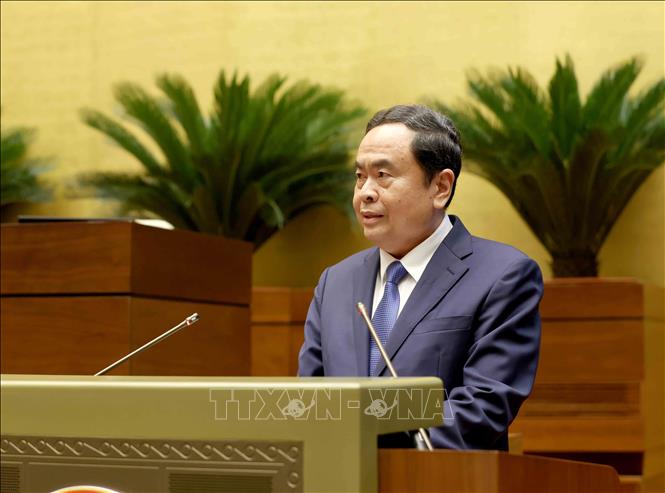
National Assembly Chairman Tran Thanh Man presented the topic "Key and core contents of Resolution No. 66-NQ/TW, dated April 30, 2025 of the Politburo on innovation in law-making and enforcement to meet the requirements of national development in the new era and the Action Plan to implement Resolution No. 66-NQ/TW". Photo: Phuong Hoa/VNA
National Assembly Chairman Tran Thanh Man stated: The issuance of Resolution 66 is an objective requirement of the innovation process, aiming to create a breakthrough in improving the quality and effectiveness of law-making and enforcement work, meeting development requirements in the new era of national prosperity and development.
According to the National Assembly Chairman, in recent years, the work of building and implementing laws has achieved important results, contributing to creating a legal foundation for the country's rapid and sustainable development. The thinking and theoretical awareness of the socialist rule of law state have been constantly improved. The Vietnamese legal system has been formed relatively synchronously, covering most areas of social life. The National Assembly of all terms has issued 213 laws and codes that are in legal effect (of which, since the beginning of the 15th term, the National Assembly has issued 65 laws; during the 7th and 8th regular sessions and the 9th extraordinary session alone, the National Assembly issued 33 laws, 9 resolutions on legal norms and 52 other resolutions); the Government and the Prime Minister have issued thousands of decrees and decisions, and ministries and branches have issued tens of thousands of circulars.
Along with that, the quality of legal documents has been improved. The organization and enforcement of laws has had positive changes. Notably, the work of building and enforcing laws has made an important contribution to maintaining political stability, ensuring social order and safety, promoting socio-economic development and international integration.
In addition to the achievements, the work of building and enforcing laws still has many shortcomings and limitations. These are: Some policies and orientations of the Party have not been institutionalized promptly and fully. The thinking of building laws in some areas is still inclined towards management, not paying due attention to promoting development and creating motivation for innovation. The quality of building laws has not kept up with the requirements of practice. The decentralization and delegation of powers in many areas is not strong enough, thorough, lacking clarity on responsibilities and authority; administrative procedures are still cumbersome, complicated, causing trouble for people and businesses. The work of organizing law enforcement is still a weak link...
5 guiding viewpoints and 7 groups of tasks and solutions
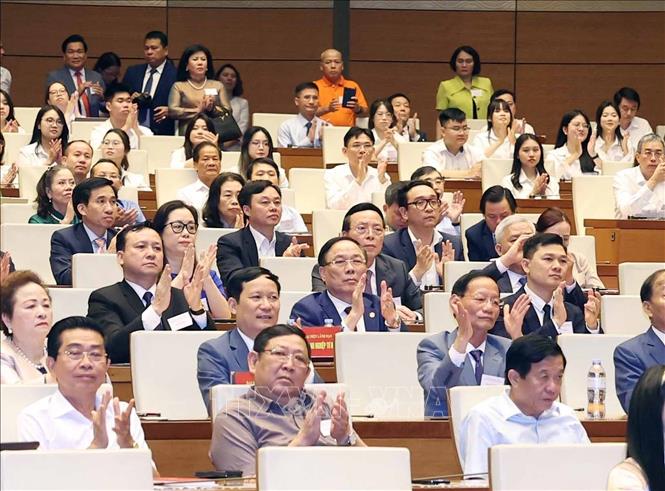
Delegates attending the conference at the main bridge point of Dien Hong Hall, National Assembly House. Photo: Thong Nhat/VNA
Regarding the core contents of Resolution 66, National Assembly Chairman Tran Thanh Man said that the Resolution clearly points out 5 guiding viewpoints. These are ensuring the comprehensive and direct leadership of the Party in law-making work, strengthening the Party's leadership in law enforcement work; identifying law-making and law enforcement work as the "breakthrough of breakthroughs" in perfecting the country's development institutions.
Along with that, law-making must closely follow reality, selectively absorb the quintessence of humanity, turn institutions and laws into competitive advantages, solid foundations, strong driving forces for development, create room to promote "double-digit" economic growth; improve people's lives, prevent corruption, waste, and negativity to ensure national defense, security, and foreign affairs of the country. At the same time, improve the effectiveness of law enforcement, focus on building a culture of law compliance, ensure respect for the Constitution and laws, ensure close connection between law-making and law enforcement; clearly identify investment in policy and law-making as investment for development. The State ensures and prioritizes resources and has specific and outstanding regimes and policies for strategic research, policy, law-making, and human resources directly and regularly performing these tasks.
The Resolution sets out medium-term and long-term goals for law-making and enforcement, closely following the requirements and timelines for implementing the two 100-year strategic goals set by our Party. At the same time, to ensure implementation with a roadmap, steps, focus, key points, and feasibility, the Resolution clearly defines specific goals for the immediate future and for the 16th National Assembly term.
The National Assembly Chairman emphasized that the Resolution also identified 7 groups of tasks and solutions that need to be focused on in the coming time. First of all, the Resolution affirmed that building and enforcing laws is a key task of building a socialist rule-of-law state, which needs to be carried out under the comprehensive and direct leadership of the Party.
An important point is to fundamentally innovate the thinking of law-making. Laws must fully and promptly institutionalize the Party's policies; stem from the overall interests of the country, giving priority to ensuring human rights and citizens' rights. Laws are identified as the country's competitive advantage, so the Resolution requires a decisive abandonment of the mindset of "if you can't manage it, then ban it" - instead, we must encourage creativity and unleash development resources. Legal regulations need to be stable, simple, easy to understand, with people and businesses at the center. Law-making work is required to be very proactive in strategic research and selectively refer to international experience, in order to increase predictability and improve policy quality.
At the same time, the Resolution emphasizes the need to perfect the transparent and professional legislative process and publicize comments, not making it difficult for people and businesses; requiring breakthroughs in law enforcement; promoting the spirit of serving the people of civil servants, ensuring the viewpoint that "people and businesses are allowed to do what is not prohibited by law".
The Fatherland Front, unions and social organizations are mobilized to actively participate in monitoring law enforcement and disseminating legal education. The Resolution requires building a culture of law compliance, diversifying policy communication (including the application of digital technology). At the same time, resolutely not "criminalizing" economic and civil relations, not using administrative measures to resolve economic disputes, maintaining the fairness and flexibility of the law.
Absolutely do not let the situation of "talk a lot but do little", "talk but do not do" happen.
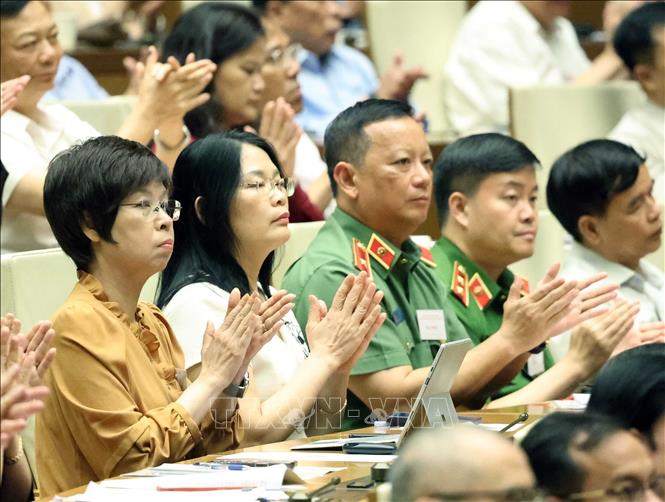
Delegates attending the conference. Photo: Phuong Hoa/VNA
National Assembly Chairman Tran Thanh Man stated: Resolution No. 197 dated May 17, 2025 of the National Assembly on a number of special mechanisms and policies to create breakthroughs in the work of building and organizing law enforcement to promptly institutionalize the decisions of Resolution 66, immediately remove obstacles and inadequacies in financial mechanisms, ensure high-quality human resources as well as meet the requirements of modernization and digital transformation in the work of building and enforcing laws.
Resolution No. 197 stipulates a number of unique and outstanding mechanisms and policies that are unprecedented, not only the 0.5% annual state budget expenditure for law-making work, the establishment of the Fund to Support Law and Policy Making, but also the mechanism of spending, spending levels, regimes and special incentive policies for cadres and civil servants at a number of central and local agencies and units that directly and regularly do consulting work on strategy and policy research, law making and a number of law enforcement activities that directly support law making.
The Resolution ensures that special mechanisms and policies are applied for the right purposes, to the right people, to the right work, with focus, accurately and comprehensively identifying and regulating the direct subjects, regularly doing the work of consulting on strategy research, policies, and law making.
The Resolution has both general, general, principled provisions and a number of specific provisions that can be implemented immediately after the Resolution is passed. The budget contents ensure expenditure and implementation measures to facilitate and comply with regulations, special mechanisms and policies for the work of building and organizing law enforcement. During the implementation process, if necessary, adjustments and supplements can be made to meet practical requirements.
The Government will have detailed regulations and specific instructions; have a control mechanism to ensure requirements on efficiency, publicity, transparency, practice of thrift, anti-waste, and especially prevention and combat of corruption, negativity, group interests, and local interests.
In particular, regarding the policy of promoting the application of digital technology and digital transformation to serve the innovation and modernization of law-making and law enforcement: focusing on building a large legal database as a shared digital infrastructure platform, unified in the management and comprehensive storage of data sources; integrating and connecting information systems to be able to update, exploit, and share to simultaneously serve multiple purposes for law-making and law enforcement; promoting the development and application of digital technology.
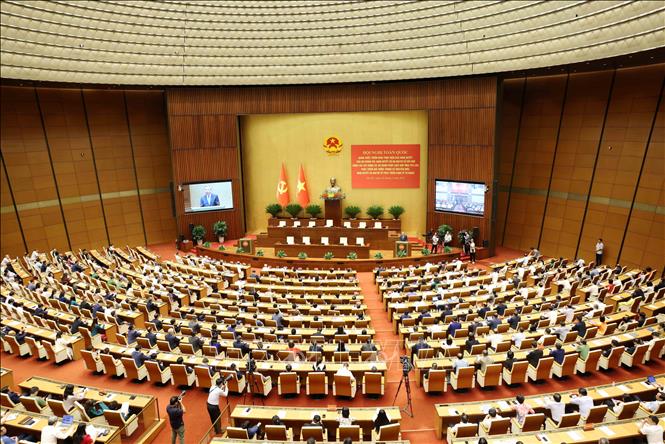
Overview of the conference. Photo: Phuong Hoa/ VNA
The National Assembly Chairman said that, based on Resolution 66, dated May 16, 2025, the National Assembly Party Committee issued Action Plan No. 28. The Government Party Committee issued Resolution No. 140, dated May 17, 2025, promulgating the Action Program, comprehensively defining the contents and tasks for implementation. In particular, some key tasks are: Institutionalizing the Party's policy on amending and supplementing a number of articles of the 2013 Constitution and related laws to continue to reorganize the apparatus of the political system; requesting the Government, ministries, branches and localities to promptly concretize and guide the implementation of the National Assembly's Resolution on a number of special mechanisms and policies to create breakthroughs in law making and enforcement.
The next key tasks are to soon complete the promulgation of laws and documents detailing and guiding the implementation of laws in various fields, meeting practical requirements. Implementing innovation in legislative thinking, in the construction, revision and completion of draft laws submitted to the National Assembly for approval, the Party Committee of the National Assembly closely coordinates with the Party Committee of the Government and relevant agencies to focus on ensuring the principle: a number of codes and laws regulating human rights, civil rights, and judicial proceedings need to be specific; basically, other laws, especially laws regulating the contents of development creation, only regulate framework issues, issues of principle under the authority of the National Assembly, while practical issues that frequently change are assigned to the Government, ministries, branches and localities to ensure flexibility and suitability to reality.
In 2025, the National Assembly Party Committee, the Government Party Committee and agencies and organizations will summarize the implementation of the Law-making Program Orientation for the 15th National Assembly term, carefully evaluate the achieved results, shortcomings and limitations; at the same time, closely follow the documents of the 14th National Party Congress, key tasks and orientations for national development to build the legislative program orientation for the 16th National Assembly term, as a basis for building the annual legislative program so that ministries, branches, central agencies and local authorities can proactively carry out legislative tasks.
The National Assembly Chairman requested that the Party Committees of other agencies and organizations, according to their functions and tasks, urgently develop plans and lead the organization to effectively implement Resolution No. 66 and Resolution No. 197. Accordingly, based on the contents of the Resolution and related contents in the Action Program of the National Assembly Party Committee and the Government Party Committee, they should promptly issue plans to implement the Resolution of their agencies. In particular, it is necessary to correctly and fully identify the tasks of each agency, associated with specific implementation deadlines and clear output results. At the same time, there must be a mechanism to monitor, supervise and inspect the implementation to ensure that the policies and decisions in the Resolution soon come into life, bringing about specific results that can be counted and people can feel the change in a positive direction; absolutely not allowing the situation of "talking a lot but doing little", "talking but not doing".
Regarding ensuring the comprehensive and direct leadership of the Party in law-making work and promoting the Party spirit in law-making and enforcement, Party committees of agencies need to pay attention to ensuring the implementation of a number of new requirements on the responsibilities of heads of ministries and ministerial-level agencies, in conjunction with the work of evaluating, rewarding, using cadres and sanctions and handling measures for those who do not fully perform their leadership and direction responsibilities in law-making and enforcement.
The National Assembly Chairman requested to continue strictly implementing discipline, regulations on power control, prevention and fight against corruption, waste, negativity, and "group interests" in law-making and enforcement in accordance with the requirements of Resolution No. 66 and Regulation No. 178 dated June 27, 2024 of the Politburo.
To achieve the breakthrough goals set out in the Resolution, each agency, organization, cadre and party member must uphold their sense of responsibility, innovate their leadership methods and implement tasks and solutions proactively, creatively and substantially. The tasks are very heavy but also extremely glorious. Each agency and each individual must turn their determination into concrete actions: promoting institutional improvement, in parallel with strict enforcement of the law and encouraging creativity.
"We believe that, with the highest political determination, and the response and synchronous participation of the entire political system under the leadership of the Party Central Committee, the Politburo, and the Secretariat headed by General Secretary To Lam, we will successfully carry out the revolution in streamlining the political system's apparatus to be streamlined, strong, effective, efficient, and effective, building a society that respects the rule of law, ready to bring the country to strong and prosperous development in the new era," the National Assembly Chairman emphasized.
Phan Phuong (Vietnam News Agency)
Source: https://baotintuc.vn/thoi-su/chu-tich-quoc-hoi-tran-thanh-man-hoan-thien-the-che-song-song-voi-thi-hanh-nghiem-minh-phap-luat-va-khuyen-khich-sang-tao-20250518115446251.htm







![[Photo] Closing of the 13th Conference of the 13th Party Central Committee](https://vphoto.vietnam.vn/thumb/1200x675/vietnam/resource/IMAGE/2025/10/08/1759893763535_ndo_br_a3-bnd-2504-jpg.webp)
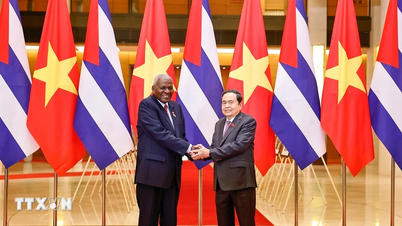




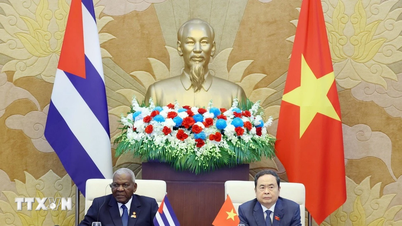
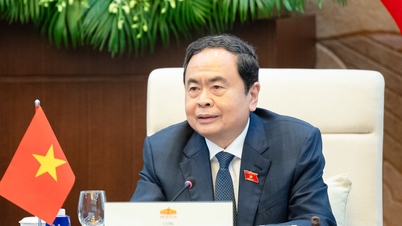

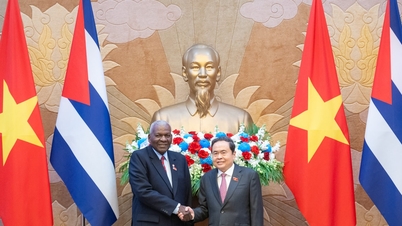



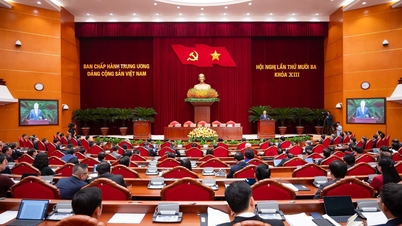


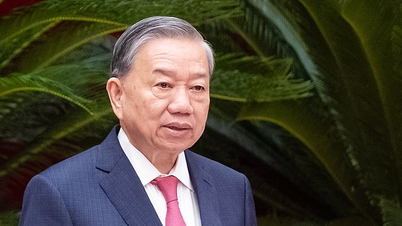







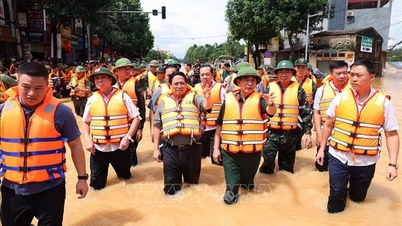

































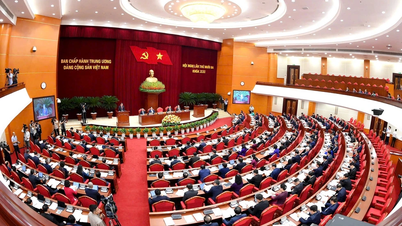







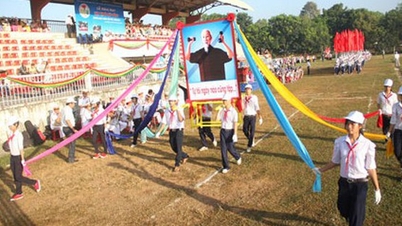
























Comment (0)